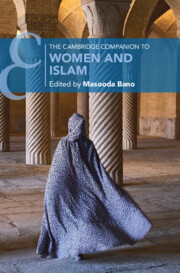Book contents
- The Cambridge Companion to Women and Islam
- Cambridge Companions to Religion
- The Cambridge Companion to Women and Islam
- Copyright page
- Contents
- Contributors
- Preface
- A Note on Foreign-Language Words
- Introduction
- Part I Logic of Classical Reasoning
- 1 Women in the Qur’an
- 2 Women’s Inheritance
- 3 Veiling and Restrictions on Sexual Liberty
- 4 Muhammad: The Ideal Man
- 5 Prophet’s Wives: “Mothers of the Believers”
- Part II Asserting Agency in Faith
- Part III Asserting Agency in Socio-Political Life
- Volume Bibliography
- Index
- Cambridge Companions To … (continued from page ii)
- References
1 - Women in the Qur’an
from Part I - Logic of Classical Reasoning
Published online by Cambridge University Press: 12 April 2025
- The Cambridge Companion to Women and Islam
- Cambridge Companions to Religion
- The Cambridge Companion to Women and Islam
- Copyright page
- Contents
- Contributors
- Preface
- A Note on Foreign-Language Words
- Introduction
- Part I Logic of Classical Reasoning
- 1 Women in the Qur’an
- 2 Women’s Inheritance
- 3 Veiling and Restrictions on Sexual Liberty
- 4 Muhammad: The Ideal Man
- 5 Prophet’s Wives: “Mothers of the Believers”
- Part II Asserting Agency in Faith
- Part III Asserting Agency in Socio-Political Life
- Volume Bibliography
- Index
- Cambridge Companions To … (continued from page ii)
- References
Summary
Karen Bauer offers a comprehensive review of the Islamic moral framework as outlined in the Qur’an, situating Islamic gender norms within this context. The chapter demonstrates how these norms support a hierarchical structure that also emphasizes fairness.
- Type
- Chapter
- Information
- The Cambridge Companion to Women and Islam , pp. 41 - 63Publisher: Cambridge University PressPrint publication year: 2025

